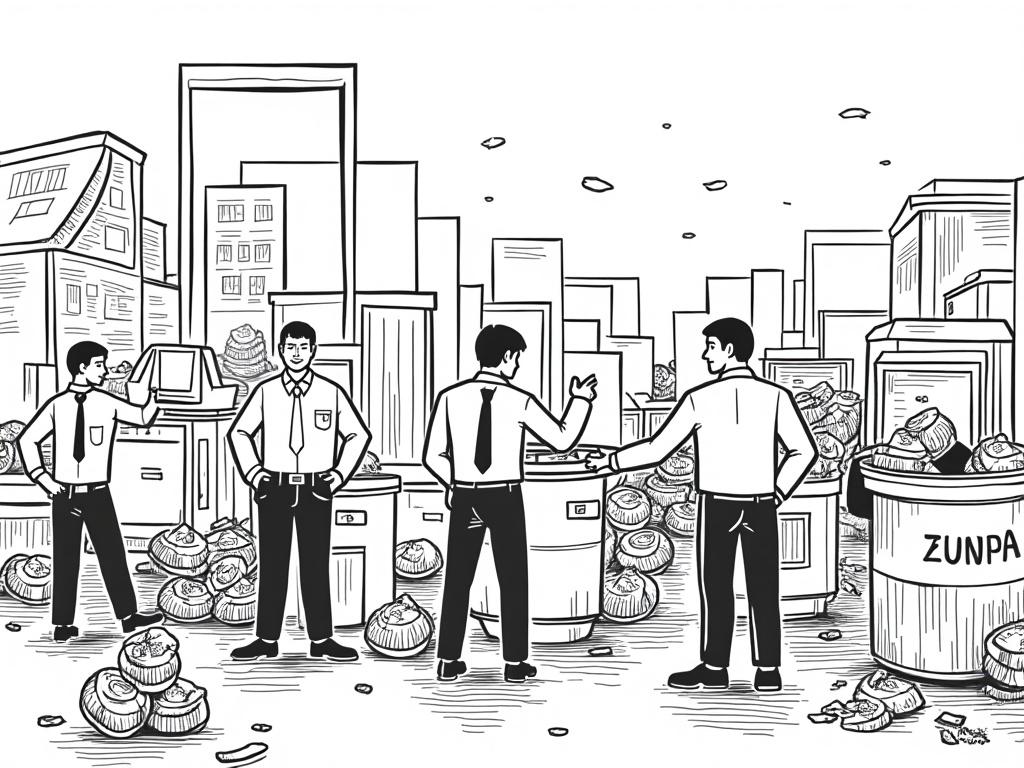
Waste Management and Recycling Investments in Greece: Your Complete Guide to Green Opportunities
Reading time: 12 minutes
Ever wondered how Greece is transforming its environmental landscape while creating lucrative investment opportunities? You’re about to discover a sector that’s not just cleaning up the country—it’s generating serious returns for savvy investors.
Table of Contents
- Current Waste Management Landscape in Greece
- Investment Opportunities and Market Potential
- Regulatory Framework and EU Compliance
- Success Stories and Real-World Examples
- Challenges and Strategic Solutions
- Your Investment Roadmap Forward
- Frequently Asked Questions
Current Waste Management Landscape in Greece
Greece generates approximately 5.1 million tons of municipal waste annually, with recycling rates that have dramatically improved from just 17% in 2010 to over 38% in 2023. This transformation didn’t happen overnight—it represents a €2.8 billion investment opportunity that’s reshaping the entire Mediterranean region’s approach to waste management.
Here’s the straight talk: Greece’s waste management sector is experiencing unprecedented growth, driven by EU mandates, environmental consciousness, and significant financial incentives. The country must achieve a 65% recycling rate by 2035, creating massive opportunities for investors who understand the landscape.
Key Market Drivers
The Greek waste management revolution is powered by several compelling factors:
- EU Compliance Requirements: Strict deadlines for landfill reduction and recycling targets
- Tourism Industry Pressure: 33 million annual visitors demanding sustainable practices
- Government Incentives: Tax breaks and subsidies for green technology investments
- Island Communities: Unique challenges creating specialized market niches
Quick Scenario: Imagine you’re considering investing in waste-to-energy facilities. What makes Greece particularly attractive? The country still sends 80% of its waste to landfills, compared to the EU average of 23%. This gap represents enormous potential for innovative solutions.
Regional Variations and Opportunities
Different regions offer distinct investment profiles. The Peloponnese region, for instance, combines agricultural waste streams with growing tourism demands, creating unique opportunities for investors seeking property for sale in peloponnese to establish waste processing facilities near coastal tourism hubs.
Waste Generation by Sector (2023)
Investment Opportunities and Market Potential
The Greek waste management sector offers diverse investment avenues, each with distinct risk-reward profiles. From high-tech sorting facilities to innovative biogas plants, opportunities span the entire waste value chain.
High-Growth Investment Sectors
Waste-to-Energy (WtE) Plants: With only two operational WtE facilities serving a population of 10.7 million, Greece desperately needs capacity expansion. Current projects show IRRs of 12-15% over 20-year concessions.
Automated Sorting Technologies: Smart sorting systems using AI and robotics can achieve 95% separation efficiency compared to manual sorting’s 60-70%. Investment requirements range from €500,000 for small facilities to €15 million for regional centers.
Organic Waste Processing: Food waste comprises 35% of Greece’s municipal waste stream. Anaerobic digestion facilities processing 50,000 tons annually can generate €2.3 million in annual revenue through energy sales and compost production.
| Investment Type | Initial Investment | Expected IRR | Payback Period | Risk Level |
|---|---|---|---|---|
| Waste-to-Energy | €25-45M | 12-15% | 7-9 years | Medium |
| Recycling Facilities | €2-8M | 18-22% | 5-6 years | Low-Medium |
| Biogas Plants | €3-12M | 15-20% | 6-8 years | Medium |
| Smart Collection Systems | €500K-2M | 25-35% | 3-4 years | Low |
| Composting Operations | €1-4M | 20-28% | 4-5 years | Low |
Financing and Incentive Structures
Greece offers attractive financial packages for waste management investments. The Recovery and Resilience Fund allocates €587 million specifically for circular economy projects, while the European Investment Bank provides low-interest loans for qualifying green investments.
Pro Tip: The right timing isn’t just about market entry—it’s about aligning with policy cycles. Greece’s National Waste Management Plan (2024-2030) identifies priority investment zones, offering streamlined permitting and enhanced incentives.
Regulatory Framework and EU Compliance
Understanding Greece’s regulatory environment is crucial for successful waste management investments. The framework combines national legislation with EU directives, creating both opportunities and compliance requirements.
Well, here’s the straight talk: Navigating Greek waste management regulations isn’t about perfection—it’s about strategic compliance that turns requirements into competitive advantages.
Key Regulatory Milestones
Greece must achieve several critical targets by 2035:
- 65% recycling rate for municipal waste (currently 38%)
- 10% maximum landfilling (currently 80%)
- Extended Producer Responsibility covering all packaging materials
- Separate collection for textiles and hazardous household waste
The regulatory landscape creates clear investment priorities. Projects addressing landfill diversion receive preferential treatment, including fast-track permitting and enhanced financial incentives.
Permitting and Compliance Strategies
Successful regulatory navigation requires understanding three key layers:
National Level: The Hellenic Ministry of Environment sets overall policy direction and manages EU compliance reporting.
Regional Level: Each of Greece’s 13 regions develops specific waste management plans aligned with local needs and EU requirements.
Municipal Level: Local authorities manage collection services and can partner with private investors for facility development.
Success Stories and Real-World Examples
Case Study 1: Integrated Waste Management of Crete
Crete’s transformation from waste management laggard to leader illustrates the sector’s potential. The island’s €180 million integrated waste management project, completed in 2022, demonstrates how strategic investment creates measurable returns.
Challenge: Crete generated 320,000 tons of waste annually with only 12% recycling rate and complete landfill dependence.
Solution: A public-private partnership developed four regional facilities including mechanical biological treatment, materials recovery, and composting capabilities.
Results: Within 18 months, recycling rates reached 52%, landfill waste decreased by 65%, and the project generates €14 million annual revenue through energy sales and recovered materials.
Investor Impact: Private partners achieved 16.8% IRR while creating 340 direct jobs and establishing Greece as a regional waste management technology hub.
Case Study 2: Athens Metropolitan Biogas Initiative
The Athens region’s biogas project showcases urban organic waste monetization. This €23 million facility processes 80,000 tons of food waste annually, serving 1.2 million residents.
Innovation Factor: Integration with existing district heating systems maximizes energy utilization efficiency, achieving 89% energy recovery compared to typical 65% rates.
Financial Performance: Annual revenues of €7.2 million through electricity sales, heat generation, and digestate sales to agricultural cooperatives.
Case Study 3: Thessaloniki Smart Collection Network
Northern Greece’s largest city implemented IoT-enabled waste collection, reducing operational costs by 34% while improving service quality.
Technology Integration: 12,000 smart bins equipped with fill-level sensors and GPS tracking optimize collection routes and schedules.
Measurable Impact: Collection efficiency improved 34%, fuel consumption decreased 28%, and citizen satisfaction increased to 87% from previous 61%.
Challenges and Strategic Solutions
Infrastructure Development Bottlenecks
Challenge: Greece’s fragmented municipal structure complicates large-scale infrastructure development. With 332 municipalities, coordination challenges often delay project implementation.
Strategic Solution: Regional cooperation frameworks pool resources and share costs. The successful Peloponnese Waste Management Union demonstrates how five municipalities reduced individual investment requirements by 60% through shared facilities.
Practical Implementation:
- Identify neighboring municipalities with compatible waste streams
- Develop joint procurement strategies reducing equipment costs
- Share operational expertise and maintenance responsibilities
- Create regional waste exchange platforms maximizing resource recovery
Financing Accessibility Issues
Challenge: Smaller investors struggle accessing EU funding programs designed for large-scale projects, creating market concentration risks.
Strategic Solution: Innovative financing structures combine public guarantees with private capital. The Hellenic Development Bank’s Green Bond program provides mezzanine financing bridging funding gaps.
Alternative Approaches:
- Cooperative Investment Models: Multiple small investors pool resources for shared facilities
- Equipment Leasing Arrangements: Reduce upfront capital requirements by 40-60%
- Revenue-Sharing Partnerships: Municipalities provide land and waste streams while investors contribute technology and operations
Technology Adoption Barriers
Challenge: Limited technical expertise in advanced waste processing technologies creates operational risks for investors.
Strategic Solution: Technology transfer partnerships with established European operators provide knowledge sharing and risk mitigation.
Ready to transform compliance challenges into competitive advantages? Focus on these practical strategies:
- Early Stakeholder Engagement: Build relationships with municipal leaders before formal project proposals
- Demonstration Projects: Pilot small-scale implementations proving technology effectiveness
- Local Workforce Development: Invest in training programs creating community support and operational sustainability
Your Investment Roadmap Forward
Greece’s waste management transformation represents more than environmental necessity—it’s a generational wealth creation opportunity for investors who understand timing, technology, and regulatory alignment.
Immediate Action Steps (Next 6 Months)
1. Market Research and Due Diligence
Conduct detailed analysis of regional waste generation patterns, existing infrastructure gaps, and competitive landscape. Focus on areas with highest tourism density and agricultural waste streams for maximum revenue diversification.
2. Regulatory Compliance Preparation
Engage legal counsel specializing in Greek environmental law and EU waste directives. Establish relationships with regional authorities managing permits and approvals. Pre-application consultations reduce approval timelines by 40-60%.
3. Technology Partnership Development
Identify proven technology providers with Greek market experience. Negotiate equipment supply agreements including training, maintenance, and performance guarantees. Consider partnerships reducing technology risk while maintaining operational control.
4. Financing Structure Optimization
Explore EU funding programs, Greek development bank facilities, and private investment options. Structure financing combining grants, low-interest loans, and equity investment minimizing cost of capital while maintaining flexibility.
5. Site Selection and Acquisition
Prioritize locations near waste generation sources with good transportation access and utility connections. Consider existing industrial sites requiring minimal environmental remediation. Evaluate proximity to energy grid connection points for waste-to-energy projects.
Looking Ahead: The Next Decade
Greece’s waste management sector will likely consolidate around regional hubs offering integrated services. Early investors establishing strong market positions will benefit from economies of scale and operational expertise advantages.
The circular economy transformation extends beyond waste processing—it’s creating entirely new value chains connecting waste recovery, materials production, energy generation, and agricultural enhancement. Smart investors are positioning themselves across multiple value chain segments.
Are you ready to be part of Greece’s green transformation while building substantial investment returns? The window for early-mover advantages is narrowing as institutional investors recognize the sector’s potential. Your next step isn’t just about entering a market—it’s about defining your role in Mediterranean Europe’s sustainable future.
Success in this sector requires more than capital—it demands understanding regulatory dynamics, technology trends, and local market conditions. But for investors who do their homework, Greece’s waste management revolution offers compelling risk-adjusted returns while contributing to meaningful environmental progress.
Frequently Asked Questions
What are the minimum investment requirements for entering Greece’s waste management sector?
Investment requirements vary significantly by project type and scale. Small recycling facilities can start with €500,000-€1 million, while comprehensive waste-to-energy plants require €25-45 million. However, innovative financing structures including equipment leasing, public-private partnerships, and cooperative investment models can reduce upfront capital requirements by 40-60%. The key is matching your investment capacity with appropriate market opportunities rather than competing in segments requiring excessive leverage.
How long does regulatory approval typically take for waste management projects in Greece?
Standard environmental permitting processes take 12-18 months for conventional projects, but strategic timing and preparation can reduce this significantly. Projects aligned with National Waste Management Plan priorities receive fast-track treatment, potentially reducing approval timelines to 6-9 months. Pre-application consultations with regional authorities, early stakeholder engagement, and using experienced local legal counsel are essential for minimizing delays. The investment in proper preparation typically saves 6-12 months of project timeline.
What are the biggest risks facing waste management investors in Greece currently?
The primary risks include regulatory changes affecting incentive structures, technology obsolescence in rapidly evolving markets, and municipal financial stability affecting long-term contracts. However, these risks are manageable through diversification strategies, flexible technology partnerships, and contract structures including performance guarantees. Currency risk is minimal within the Eurozone, and political risk has decreased significantly as environmental compliance becomes non-negotiable under EU directives. The bigger risk for most investors is missing the current opportunity window as the sector rapidly matures.

Article reviewed by Charlotte Ellsworth, Commercial Real Estate Developer | Transforming Urban Landscapes, on June 6, 2025


